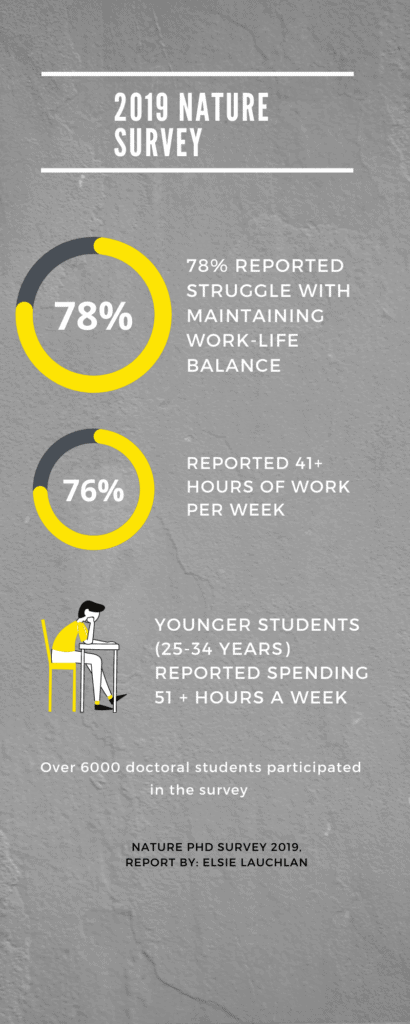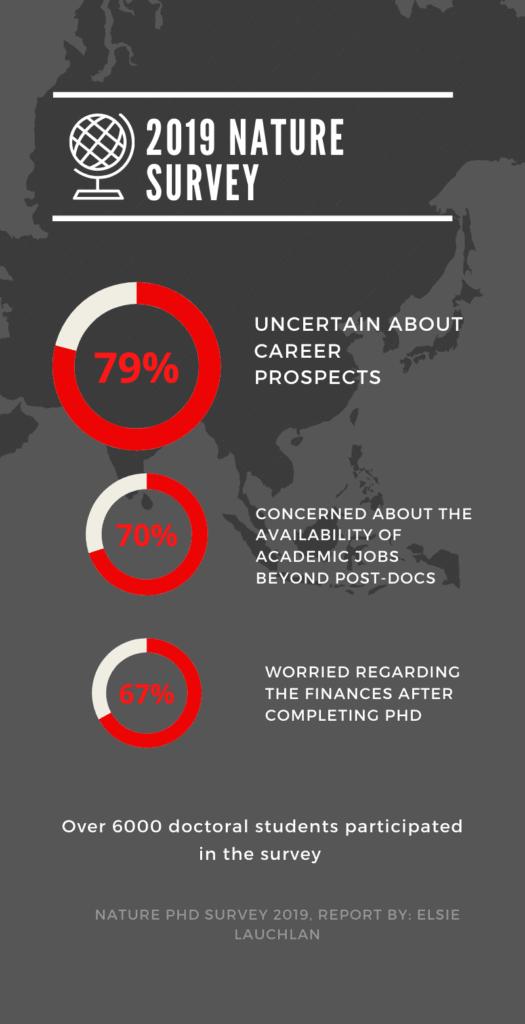Before we mess with other things in this post, I want to say this directly to you.
A higher degree may not translate to a higher paycheck.
That said, lets dive into the PhD and job comparison.
But wait,
PhD and job in the industry comparison may feel inadequate due to one main reason.
- there is an inner drive and satisfaction a researcher gets from exploring something new. Most jobs cannot compensate this satisfaction because they are comprised of boring and repeatable tasks.
Please note that
- if you are here to find that you should choose a job in the industry or a PhD, then PhD might not be the thing for you.
- a PhD is only for those who need it for the next step in their career. If you do not need a PhD for your long-term carrier goals then a PhD might not be for you.
If you are still wondering, try the industry job for a while.
Here are a few things you should take into account when deciding whether to do a job or a PhD.
1. Earning
An individual human should not suffer for the greater good of science. No matter how “intellectual” the journey is, a worker’s (academic or non-academic) compensation matters.
If you are not paid to do the PhD, that means the school doesn’t need you to do their work. So, don’t even think about an unpaid PhD.
Why a PhD without funding is not possible? I discussed this issue in this post. If in hurry, you can skim through bulleted points list under the heading: The real meaning of absence of funding.
a) PhD: Overworked, and underpaid / Job: Immediate earning potential
If you are not single and have a family to support, the dollar should precede the scholarly exploration.
The job in the industry can support you and your family (even at a starting package). However, your PhD may or may not be funded. If it is, you will get a small stipend. (Yes, a barely surviving package). A lot of PhD students struggle with their finances due to insufficient financial support and income.
Is a PhD Stipend in the USA enough for international students without any other financial support? I discussed this issue here.
In hurry? Read the short answer provided at the start of the post.
Here is a short comparison between PhD stipend and the entry level job salary after your Bachelor or Master.
PhD Stipend
The stipend will usually be steady (or increase slightly) during your PhD years.
In some countries, PhD students are considered employees and salary may increase on yearly basis.
If you are married and have kids, you should really think about affording family expenses on a PhD stipend. For more details on the possibility of bringing your dependents with you. Read the heading: survive in the USA as PhD student– Family here
Job Salary
A job might start low if you are embarking on a new career after your recent degree.
However, there are a lot of growth opportunities. Your chances of getting raise in a short time period are high.
You can switch jobs, which usually leads to an increased salary.
| Region | Subjects | Per Annum Stipend | Initial job after Masters |
|---|---|---|---|
| USA | Biological Sciences | $25,000 – $32,000 | $ 57,000- $70,000 |
| STEM Subjects | $30,000 – $50,000 | $73,000 – $85000 | |
| Social Sciences | $20,000 – $28,000 | $ 52000 – $58000 | |
| UK | Range for most majors | £15000 – £ 18000 | £24,000 – £ 27,000 |
| Germany | Range for most majors | € 12000 – € 25000 | € 38000 – € 51000 |
| Australia | Range for most majors | $ 28,597 – $ 39000 | $39,000 – $60,000 |
Details regarding PhD stipends for US, UK, Germany, Australia as well as salaries after masters for US, UK, Germany, Australia are provided on these websites
b) Debt and long-term earning potential
Some people confuse the earning potential when considering a PhD or a job. They assume that a higher degree will translate into higher earning.
PhD is research training (required for a specific kind of job) and not some MBA.
The higher growth potential for the rest of your career might be higher because of the certain PhD degrees, for example, bioinformatics, finance, etc. However, for most subjects, a PhD might not be a good return on investment.
Data clearly showed that a Master’s degree on average offers the highest leap in earning, while the postdoc contracts are miserable.
Here is a simple comparison between starting big (which may not be the case for most non-STEM PhDs) and steady growth at the job.
Starting Big
Yes, the ones who believed in delayed gratification might argue that after PhD you can earn more. This can be true for some areas of research only. However, that might not be valid for many other fields of study.
One thing to note here is that PhD is training for research and teaching. Thus, the PhD programs expect you to continue in academia after graduation.
Academic salaries are comparatively very low, especially for the first decade of your academic career. Low enough, that academics struggle to make the ends meet.
The catch is PhDs mostly start at entry-level positions after graduation because they are new to the corporate arena.
Steady Growth
If you are starting your new career after your Bachelor’s or Master’s studies, you may start small.
However, the industry usually offers steady growth. In time, you can make far more than a third/fourth year PhD stipend.
Industry, on the other hand, compensates for an experience far more profoundly compared to academia.
While those who started with lower degrees get promotions and raises in all those years.
Comparing few Post-doc, PhD graduate, and a Master’s Graduate Salaries
| Region | Area of Postdoc study | Postdoc Salary | Job title with PhD | PhD Salary in Industry | Job Title | Master holder Salaries after 5 years of experience |
|---|---|---|---|---|---|---|
| USA | Chemistry | $56,000 | Analytical Chemist | $82,000 | QC Chemist | $68,000 |
| Data Science | $62,000 | Data Scientist | $140,000 | Data Scientist | $120,000 | |
| Social science | $55,000 | Social Worker | $94,000 | Social Worker | $72,000 | |
| Agronomy | $52,000 | Research Scientist Agronomy | $82,000 | Agronomist | $86,000 |
Simply put, the academic path is not for the faint-hearted, neither for those who need to select between being broke or earn the next paycheck.
- First, the overworked and underpaid PhD years.
- Second, you are tested by the uncertainties of the postdoc contracts.
- Third, you are stretched by temporary faculty positions.
- Finally, stability and job security only arrive after the tenure track (yes, the academic lottery scheme).
2. Learning
Ivory Tower or Corporate Hustle
Life-long learners are everywhere in today’s information-loaded world.
In industry, you are likely to deal with different subject matters and learn to excel at what you deliver.
While the academy is also prioritizing interdisciplinary problems, the PhD is usually focused on exploring a particular subject, and especially a particular question.
Although some might argue that a PhD will surely provide more opportunities to learn, the case might not be that simple.
Learning at ivory tower
Yes, you will study your subject during your PhD (that’s what it is all about).
However, during PhD, you will be focusing on a very particular area or question.
In research training, you are required to study many esoteric topics. They may not sound as useful or interesting.
Yes, you learn transferable skills such as public speaking and project management. However, there are less arduous ways to accomplish that. Besides, PhDs might struggle to demonstrate the transferable skills to employers.
Learning at job
When you enter the industry, the boundaries of subject applications might not be rigid as in academia. This is why some might argue that you are not acquiring more knowledge regarding the subject you love.
However, that might not be the case. The industry is always focused on the most applicable portions of knowledge (Isn’t that what matters?).
The major distinction here is that you will be learning many different things from other fields and areas. For example, you are much likely to refine your sales and leadership potential. These skills serve you best for the rest of your working life.
3. The desire to Contribute
Every good learner has an innate desire to utilize the learned subject and solve real life problems with it.
Innovation and the academia
Yes, PhD was and still is at the forefront of exploration. However, unlocking new secrets is a long process in academia.
When you start, you may not be sure that where the research exploration will take you.
Usually, it might take years (even decades) to reap the rewards of your research.
The academic checks on presenting ideas usually take a long time. For example, it might take years to publish a peer-reviewed paper.
Innovation in the industry
In the contemporary world, companies can go from nothing to the fortune 500 and then might disappear again, only within 5 years time period.
The industry is more focused on delivering something new day by day to keep up with the competition. Therefore, innovative projects are short-term.
Thus, the chance to produce and innovate is much higher. Outputs are much quicker than academic research and innovation.
4. Workload and work-life balance
Well, PhD is like a job, but actually, it is much more than that.
During PhD, there might be less (far less) time for family time and vacations.
Workload for PhD
PhD usually requires you to work around 50 hours per week. In some cases, it might be higher than that.
Academia is known for its burnouts. The main reason PhD students report that, unlike other jobs, the work is never actually done. You always have a lot more to do.
PhD students mostly have to manage their research along with other responsibilities as part of their training (e.g., graduate courses) and funding (e.g., teaching assistantships)
Workload at job
Job on the other side is usually around 40 hours per week.
To calculate the exact work timings, you should also consider other responsibilities, for instance, overtime or on-call work settings.
The industry usually reports lower burnout rates than academia.
However, there are some jobs where the specific nature of work might be more demanding than others.
Is A PhD Really Harder Than A Job? I discussed this issue in detail here.
In Hurry? You can only look at survey results and infographics here to get an idea.
More than the Publish or Perish
Yes, the PhD is about research and something more.
These are the most common reasons that PhD students report a high workload
- In the competitive academic environment, everyone is racing and trying to accomplish more to get ahead.
- The academic work often flows down the stream in an academic hierarchy. Often the PhD supervisors delegate their work to the PhD students.
- A plethora of formal and informal task assignments other than their research work.
- In STEM, PhDs students have to deal with uncertain experiments, while the humanities and social science students are overwhelmed with the reading material.

Details regarding the survey results are provided here
Can we combine both? Is the workload of a full-time PhD and full-time job manageable?
In most cases, it’s not. You are likely to struggle in concentrating or prioritizing one over the other. Thus, chances of failing at one or both increases.
Full-time PhD and full-time work are already demanding on their own. Combining both of them might not be a good idea. There is a reason why part-time PhD options are available.
5. Things that no one talk about
There are others things that might be a consideration for anyone who needs job but aspire towards PhD.
Preparing PhD application is not a walk in the park
Preparing for a PhD can take as long as 2 years.
This is because fellowships and scholarships measure candidates’ capabilities by numerous factors.
There are a lot of factors that admission committees take into account when considering a PhD application.
The reason is that the stakes for the university’s resources are really high, especially for funded PhD positions.
Here are a few things that these competitive programs require from you.
- Research experience and publications
- Well-developed research proposal or statement of purpose
- Shinning scores in graduate and language tests
- Top 10% performance in previous degrees
- Writing samples
The competitive programs have a lower than 5% acceptance rate. The selection and rejection process of the PhD can tell a lot about the academic challenges such as
- Getting comfortable with the rejections despite your best efforts
- Unlike a job, there is no credit for all the effort if you are rejected
Therefore, you should be prepared to manage all this investment of time and energy in the application process along with your current job.
If You Leave PhD without completion
The dropout rate from PhD programs is around 50%, or more if you consider some humanities and social science PhD scenarios.
There are a lot of reasons for the high dropout rates. Some of these may be out of control of PhD students, for example, funding shortages, student-advisor relationships or high-stress levels, etc.
Remember that these are the students who have gone through all the fierce processes of acceptance in PhD. They are the high achievers in their previous academic accomplishments. Also, they are really passionate about the subject in which they are pursuing a PhD.
Leaving PhD
You get no credit for going halfway.
You might have to start at entry-level again when you try to move to the industry after leaving the PhD.
Leaving Job
Switching jobs for better prospects is common (as well as beneficial) in the industry.
You don’t lose the validity and documentation of your previous work experience. In fact, the resume gets better after every switch.
Therefore, you should keep this in mind when leaving your full-time job to pursue a full-time PhD.
The opportunity cost can be much higher if you devote some years to your academic journey and then leave it.
In short, you may lose the competitive advantage you have in the industry now.
After PhD: Begin with the end in mind
Finally, the most crucial and decisive point regarding starting a PhD is its purpose for you and your long-term goals.
What do you will do with your PhD? Can a PhD help you in achieving any of your long-term goals?
If you are going to dedicate the next 3-5 or more years of your life to a PhD, then, you must think through its outcomes.
If you want to go further in academia, which might be obvious after this rigorous research training, you should consider the percentage of those who really are hired in an academic position after their PhD.

Details regarding the survey results are provided here
Furthermore, you should also consider the chances of acquiring a permanent position as a professor.
On the other hand, if you consider the industry, where a PhD might not be a mandatory requirement for 99% of the jobs.
Two things can happen after PhD
- You may be taken as an expert in your field
- You may be taken as an overqualified person who had spent many years away from the industry.
Subject Expert
There are certain roles where the industry requires trained researchers.
Some positions in government and business prefer those with extensive research records.
Therefore, in such situations, the PhD might be an advantage to you.
Over Qualification Dilemma
While it is usually assumed that the industry hesitates in hiring PhDs due to their overqualification.
However, there might be other reasons including
- PhDs are acquainted with the tortoise-like process of academia and struggle with the fast-paced corporate working.
- Industry values meeting deadlines more than the robustness of information and data.
- PhDs get opportunities (such as academic conferences) to polish their communication skills. However, their skill level might not be at par with other knowledge workers, who have practiced their interpersonal and communication skills for years in the industry.
- The academic environment might sometimes appear as teamwork, which it is, to a certain extent. Nevertheless, most of the time, it is usually a lonely journey. On the other hand, industry jobs require you to work in teams and in-group cooperation is much encouraged and preferred than the competition.
- Hiring managers might be suspicious of your determination to work in the industry.
Conclusion
Remember that the stakes are high. This decision can make or break your golden years of good income opportunities, career advancement, and other plans.
Choosing between advanced research training such as a PhD and income opportunity in industry is surely tuff especially if you are inquisitive about your subject and are also worried about paying the bills.
However, I expect that the above-stated perspectives might help you in making this important decision.
I wasted 2 years after completing my Master’s. I learned it the hard way that PhD might not be for me. You don’t have to do that.
In my opinion, you should work in the industry for at least six months. If you still feel the “calling” from academia, then go for the PhD.
